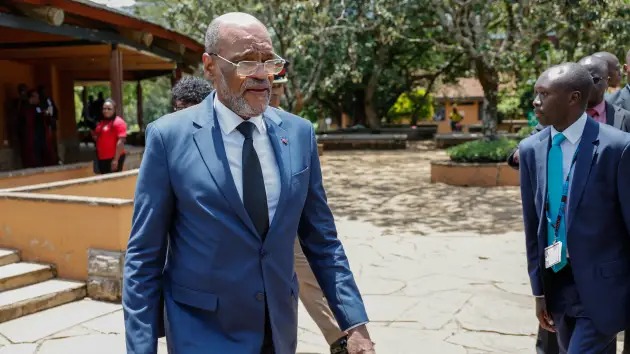Haitian Prime Minister Ariel Henry has resigned as head of the Caribbean nation, the leader of a regional body said on Monday, an unelected role the 74-year-old neurosurgeon has held since the 2021 assassination of the country’s last president.
“We acknowledge his resignation upon the establishment of transitional presidential council and naming an interim prime minister,” said Caribbean Community (CARICOM) chair and Guyanese President Irfaan Ali, thanking Henry for his service to Haiti.
Henry traveled to Kenya late last month to secure its leadership of a United Nations-backed international security mission to help police fight armed gangs, but a drastic escalation of violence in the capital, Port-au-Prince, during his absence left him stranded in the U.S. territory of Puerto Rico.
Ali said the presidential council would have two observers and seven voting members, including representatives from several coalitions, the private sector, civil society and one religious leader.
The council has been mandated to “swiftly” appoint an interim prime minister, he added, and anyone who intends to run in Haiti’s next elections will not be able participate.
Henry’s resignation comes as regional leaders met earlier on Monday in nearby Jamaica to discuss the framework for a political transition, which the U.S. has urged last week to be “expedited” as armed gangs sought to topple his government.
Regional leaders, speaking with representatives from various sectors of Haitian society, have looked into establishing the transition council intended to pave the way to the first elections since 2016.
Henry, who many Haitians consider corrupt, had repeatedly postponed elections, saying security must first be restored. Haitian senators’ last terms expired at the start of 2023.
“We all know that urgent action is needed on both the political and security tracks,” U.S. Secretary of State Antony Blinken said earlier Monday, calling for the creation of a “broad-based, inclusive, independent presidential college.”
Blinken had said the council would be tasked with meeting the “immediate needs” of Haitian people, enabling the security mission’s deployment and creating security conditions necessary for free elections.
Haiti declared a state of emergency this month as clashes damaged communications and led to two prison breaks after Jimmy “Barbeque” Cherizier, a leader of an alliance of armed groups, said they would unite and overthrow Henry.
MORE MISSION FUNDS
Henry’s resignation comes alongside regional talks over participation in an international force, which he had requested to help police fight the gangs. Their brutal turf wars have fueled a humanitarian crisis, cut off food supplies and forced hundreds of thousands from their homes.
U.S. Secretary of State Antony Blinken said Monday the United States would contribute an additional $100 million to this force and $33 million in humanitarian aid, bringing the United States’ total pledge to the force to $300 million.
It remained unclear how long it would take the funding to be approved by lawmakers and transferred. A U.N. spokesperson said that as of Monday, less than $11 million had been deposited into the U.N.’s dedicated trust fund – with no new contributions since Haiti declared its state of emergency on March 3.
Mexico’s foreign minister added that the country had contributed an unspecified amount of funds, and called for more action to stem the trafficking of arms to Haiti.
The U.N. believes Haitian gangs have amassed arsenals of weapons trafficked largely from the United States.
The United Nations estimates more than 362,000 people have been internally displaced, half of whom are children, and thousands have been killed in the conflict, with widespread reports of rape, torture and ransom kidnappings since 2021.
‘A BLOODY REVOLUTION’
In Haiti, gang leader Cherizier has threatened to go after hotel owners hiding politicians or collaborating with Henry. He demanded the country’s next leader be chosen by the people and live in Haiti, alongside their families.
Many influential Haitian political figures live abroad.
“We’re not in a peaceful revolution. We are making a bloody revolution in the country because this system is an apartheid system, a wicked system,” Cherizier said.
Residents in the capital saw heavy gunfire over the weekend as armed men downtown surrounded the National Palace on Friday night and by Sunday the United States had airlifted staff from its embassy.
On Monday, authorities extended a nightly curfew until Thursday.
Washington said it was looking to expedite the deployment of the planned security mission.
Henry first requested an international security force in 2022, but countries have been slow to offer support, with some raising doubts over the legitimacy of Henry’s unelected government amid widespread protests.
Many in Haitian communities and abroad are wary of international interventions after previous U.N. missions left behind a devastating cholera epidemic and sex abuse scandals, for which reparations were never made.
Mike Ballard, intelligence director at security firm Global Guardian, said if gangs take control of ports and airports, they would be in charge of humanitarian aid to the country, adding he did not believe Kenyan forces would effectively police or maintain peace.
“Countries with actual stakes in the region will need to step up and help shore up security,” he said, pointing to the United States, neighboring Dominican Republic and other CARICOM members.









